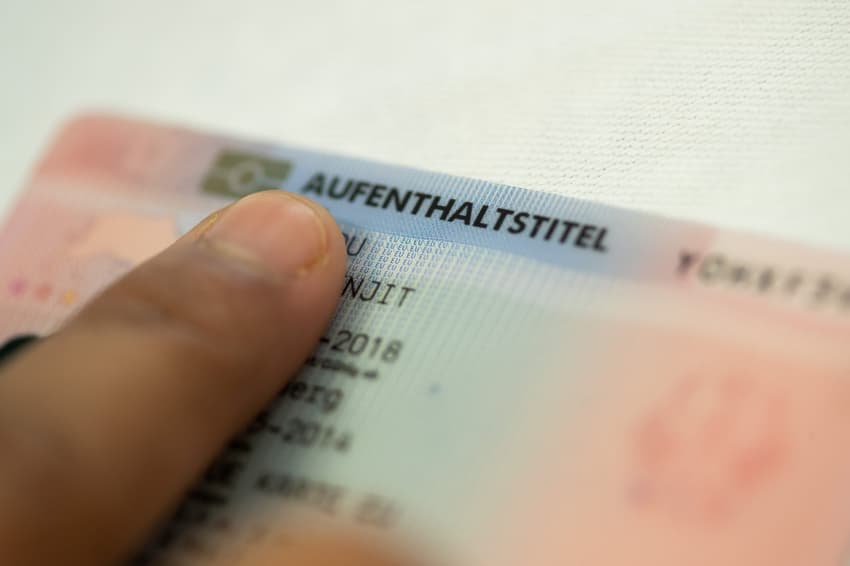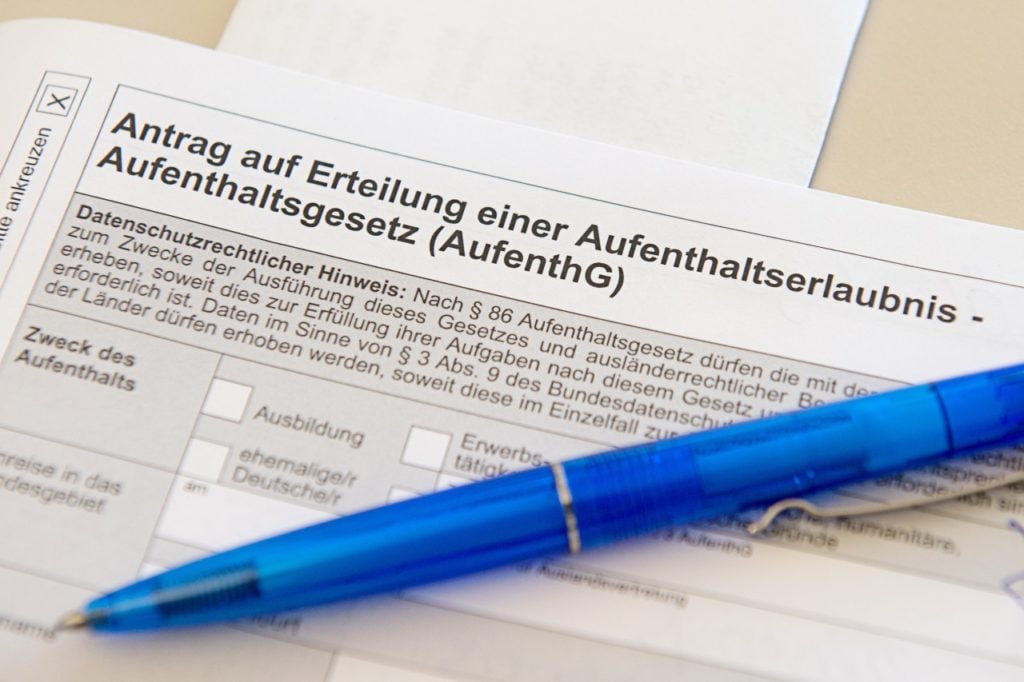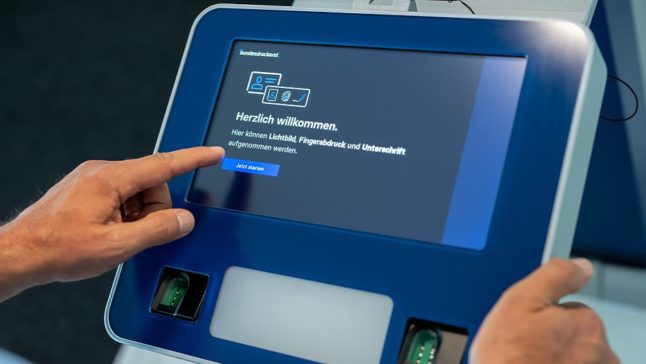EXPLAINED: How Germany wants to speed up applications for e-residence permits

With a new phased plan to digitalise the process, it could soon get easier to renew your electronic residence permit or personal ID card in Germany.
Though it often seems like digitalisation in Germany happens at a snail's pace, every so often there are small signs that things are moving along. Since June, people have finally been able to check their state, private and company pensions online, and just weeks ago, news of a mobile app enabling real-time Schufa checks and credit updates also dropped.
Now, the government has set its sights on the personal ID card - which is mandatory for all German citizens - as well as the German passport and the electronic residence permit carried by most long-term residents.
In a serious of stages over the coming years, the process for obtaining one of these should become much easier, quicker and - above all - more digital.
READ ALSO: How Germany is trying to streamline the process of getting an ID card
An ordinance mandating the changes was approved by cabinet on August 16th but still needs to be green-lit by the Bundesrat in September. However, if the upper house waves it through as expected, new procedures for applying for - and renewing - the personal ID, passport and residence permit will come into force between November 2023 and May 2025.
These are the key dates and changes to look out for.
November 1st 2023: Digital confirmation of PIN letter
After applying for any electronic ID document, whether a residence permit or a German ID card, the normal process is to receive a letter in the post that provides a PIN for the online identification function.
Previously, you generally had to confirm with a signature that this document had been received when collecting your ID card. However, from November this year, you'll simply have to consent to a text stating that the PIN has arrived.
This will lay the groundwork for passports, personal ID cards and electronic residence permits to be collected from vending machines in the future - without needing to book an appointment.
READ ALSO: What to do if you lose your residence permit in Germany
This will work a little bit like picking up a parcel from a DHL Packstation: the document will be in a locked compartment that can be opened with a code. Once the ID card or residence permit is ready for collection, the authority will get in touch with the applicant. This person then confirms receipt of their PIN letter, opens the box with the code and is able to access their brand new passport or ID card.
November 1st 2024: New legal frameworks to speed up process
According to Interior Ministry, the PIN letter for the online ID card will be handed over directly to the applicant in future - which should seriously expedite the process.
Currently, the PIN letter is sent out by post and can often take weeks to arrive.
To further speed things up, the Interior Ministry plans to lay some legal groundwork for sending things like passports and personal ID cards to recipients directly by post - rather than requiring an in-person collection. Unfortunately, though, the service will be subject to a fee.

An application for a residence permit lies on a desk at the Foreigners' Registration Office in Bietigheim-Bissingen, Baden-Württemberg. Photo: picture alliance / dpa | Wolfram Kastl
November next year will see the government making the necessary legal changes to forge ahead with both of these plans - but the ministry has cautioned that the technical implementation will take some time.
That means that both changes - handing out the PIN directly and receiving the documents by post - should come into force in the spring of 2025.
READ ALSO: How to get fast-track permanent residency rights in Germany
May 1st 2025: Digital photos and direct delivery of ID cards
May 2025 will be the date when applicants for residence permits and ID cards should really see some changes come into force. When you get your appointment at the Ausländerbehörde, your PIN letter will be handed to you in-person and you'll simply have to wait for a confirmation code to pick it up from the vending machine - or for it to arrive by post.
Another major development will be the end of physical passport photos - so you'll no longer need to shell out €10 to sit in a small photo booth at your nearest shopping centre.
Instead, digital passport photos can be taken at special terminals at the Ausländerbehörde or Bürgeramt, which can then be checked to see if they meet the required standards. If not, they can be directly re-taken and the new versions can be submitted directly to the authorities as part of your application.
According to the Interior Ministry, a pilot scheme for these photo terminals is currently underway in Berlin Reinickendorf, Bielefeld, Haldensleben, Herne, Hildesheim, München, Rostock and Stuttgart. This is due to be completed in November this year.

New terminals for producing digital photos are being piloted in several German cities and are due to be introduced in May 2025. Photo: German Interior Ministry
In addition, photo shops are also working on their own digital passport photo services, so applicants will have a choice of how to submit their photo.
The working group E-Passfoto and association Ringfoto are currently developing a system where customers receive a QR code at the photo studio after the picture has been taken. This can then be used by authorities to download the photo from a secure cloud server, meaning it can be instantly accessed as part of the application.
READ ALSO: What is Germany's electronic ID card and how do you use it?
The switch from analogue to digital photographs is another way of attempting to digitalise the process and minimise human error. Currently, some photos that are supplied to the authorities have to be redone because they aren't a good likeness or don't meet other standards - and this means that appointments then have to be rebooked, adding weeks if not months to the process.
Comments
See Also
Though it often seems like digitalisation in Germany happens at a snail's pace, every so often there are small signs that things are moving along. Since June, people have finally been able to check their state, private and company pensions online, and just weeks ago, news of a mobile app enabling real-time Schufa checks and credit updates also dropped.
Now, the government has set its sights on the personal ID card - which is mandatory for all German citizens - as well as the German passport and the electronic residence permit carried by most long-term residents.
In a serious of stages over the coming years, the process for obtaining one of these should become much easier, quicker and - above all - more digital.
READ ALSO: How Germany is trying to streamline the process of getting an ID card
An ordinance mandating the changes was approved by cabinet on August 16th but still needs to be green-lit by the Bundesrat in September. However, if the upper house waves it through as expected, new procedures for applying for - and renewing - the personal ID, passport and residence permit will come into force between November 2023 and May 2025.
These are the key dates and changes to look out for.
November 1st 2023: Digital confirmation of PIN letter
After applying for any electronic ID document, whether a residence permit or a German ID card, the normal process is to receive a letter in the post that provides a PIN for the online identification function.
Previously, you generally had to confirm with a signature that this document had been received when collecting your ID card. However, from November this year, you'll simply have to consent to a text stating that the PIN has arrived.
This will lay the groundwork for passports, personal ID cards and electronic residence permits to be collected from vending machines in the future - without needing to book an appointment.
READ ALSO: What to do if you lose your residence permit in Germany
This will work a little bit like picking up a parcel from a DHL Packstation: the document will be in a locked compartment that can be opened with a code. Once the ID card or residence permit is ready for collection, the authority will get in touch with the applicant. This person then confirms receipt of their PIN letter, opens the box with the code and is able to access their brand new passport or ID card.
November 1st 2024: New legal frameworks to speed up process
According to Interior Ministry, the PIN letter for the online ID card will be handed over directly to the applicant in future - which should seriously expedite the process.
Currently, the PIN letter is sent out by post and can often take weeks to arrive.
To further speed things up, the Interior Ministry plans to lay some legal groundwork for sending things like passports and personal ID cards to recipients directly by post - rather than requiring an in-person collection. Unfortunately, though, the service will be subject to a fee.

November next year will see the government making the necessary legal changes to forge ahead with both of these plans - but the ministry has cautioned that the technical implementation will take some time.
That means that both changes - handing out the PIN directly and receiving the documents by post - should come into force in the spring of 2025.
READ ALSO: How to get fast-track permanent residency rights in Germany
May 1st 2025: Digital photos and direct delivery of ID cards
May 2025 will be the date when applicants for residence permits and ID cards should really see some changes come into force. When you get your appointment at the Ausländerbehörde, your PIN letter will be handed to you in-person and you'll simply have to wait for a confirmation code to pick it up from the vending machine - or for it to arrive by post.
Another major development will be the end of physical passport photos - so you'll no longer need to shell out €10 to sit in a small photo booth at your nearest shopping centre.
Instead, digital passport photos can be taken at special terminals at the Ausländerbehörde or Bürgeramt, which can then be checked to see if they meet the required standards. If not, they can be directly re-taken and the new versions can be submitted directly to the authorities as part of your application.
According to the Interior Ministry, a pilot scheme for these photo terminals is currently underway in Berlin Reinickendorf, Bielefeld, Haldensleben, Herne, Hildesheim, München, Rostock and Stuttgart. This is due to be completed in November this year.

In addition, photo shops are also working on their own digital passport photo services, so applicants will have a choice of how to submit their photo.
The working group E-Passfoto and association Ringfoto are currently developing a system where customers receive a QR code at the photo studio after the picture has been taken. This can then be used by authorities to download the photo from a secure cloud server, meaning it can be instantly accessed as part of the application.
READ ALSO: What is Germany's electronic ID card and how do you use it?
The switch from analogue to digital photographs is another way of attempting to digitalise the process and minimise human error. Currently, some photos that are supplied to the authorities have to be redone because they aren't a good likeness or don't meet other standards - and this means that appointments then have to be rebooked, adding weeks if not months to the process.
Join the conversation in our comments section below. Share your own views and experience and if you have a question or suggestion for our journalists then email us at [email protected].
Please keep comments civil, constructive and on topic – and make sure to read our terms of use before getting involved.
Please log in here to leave a comment.